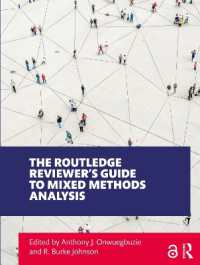- ホーム
- > 洋書
- > ドイツ書
- > Social Sciences, Jurisprudence & Economy
- > Politics, Society, Work
- > political science
Full Description
In this collection, we compare and contrast the challenges and opportunities for achieving urban water security with a focus on 11 major world cities: Bangalore, Beijing, Cairo, Cape Town, Chennai, Istanbul, Jakarta, London, Melbourne, Sao Paulo and Tokyo.








